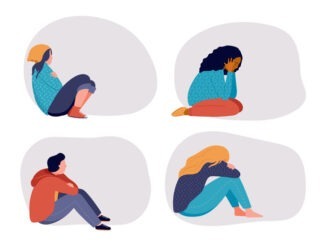
Spending time in green space, or bringing nature into your everyday life, can benefit both your mental and physical wellbeing
CREDIT: This is an edited version of an article that originally appeared on Mind
Doing things like growing food or flowers, exercising outdoors or being around animals can have lots of positive effects. It can:
- improve your mood;
- reduce feelings of stress or anger;
- help you take time out and feel more relaxed;
- improve your physical health;
- improve your confidence and self-esteem;
- help you be more active;
- help you meet and get to know new people;
- connect you to your local community;
- reduce loneliness;
- help you feel more connected to nature;
- provide peer support.
We all have different experiences of nature, and different reasons for wanting to connect with it more. You might find you get something completely different from an activity compared to someone else.
What nature ideas could I try?
Here are some tips and suggestions for enjoying nature. Don’t worry if some ideas don’t feel right for you – see if you can find some that do, or adapt one to suit you.
- Grow or pick food.
- Bring nature indoors.
- Do activities outdoors.
- Help the environment.
- Take notice of nature.
- Connect with animals.
How can I get started?
Sometimes it can be hard to know how to connect with nature. It can be difficult to get started – and many of us with mental health problems face barriers that might stop us connecting with nature.
Taking the first step
When we are feeling low, or unwell, it can be hard to find the energy to go outside or try new things. Even if we know something might make us feel better, it can still be difficult to find the motivation to get started. You might feel nervous about going outside, especially if you are used to spending a lot of time indoors. You might be unsure if it’s the right time to start something new, or you might be worried it won’t work for you. Here are some things you can try:
- Start small. Even small amounts of time in nature can boost our mood. Try spending five minutes paying attention to nature; you can do this outdoors or in your home.
- Do what works for you. Try different nature activities to find things you enjoy and that you can fit into your daily life. Try not to worry if something does not work for you.
- Do things you find relaxing. You might like to sit under a tree, look at the stars or do art activities in natural spaces. See our pages on relaxation, mindfulness and ideas to try in nature for more tips.
- Work with your highs and lows. Think about which times of day when you feel most energised, and when you find things harder. For example, if the side effects of medication make you tired in the mornings, plan your activities for later in the day.
- Remind yourself what works. Each time you have a good experience in nature, write down how you feel, or take a picture. Keep your notes or pictures on your ‘phone or in a diary; you can then try using them as motivation for next time.
- Try not to judge your feelings. When we worry about our thoughts and feelings it can be harder to take notice of our surroundings. Try to focus on what you can see, hear, smell, touch or feel – and try not to worry if you don’t feel better straight away.
- Set small challenges; this can give you a goal to focus on. It can also help you regularly connect with nature – for example, you could try to notice three things in nature each day.
Accessing nature
It can be hard to know where to find nature. Many of us do not have a garden and those of us who live in cities or towns may not live near a park or green space. You may be worried about the cost of transport, plants or gardening equipment; you might get tired easily or have difficulty doing physical activities, and green spaces are not always accessible for everyone. Here are some tips and suggestions for you to consider:
- Look for nature wherever you are; nature is everywhere, even in busy towns and cities. Walk around your local area, or look out of your window, and take notice of trees, birds, insects, the sky or the weather. The Wildlife Trusts website has information on where to spot urban wildlife.
- Look for local green spaces. Your local council may have information about parks or nature reserves near you. You can find your local park on the GOV.UK website, or you could use a walking app such as Go Jauntly to find nearby walks.
- Ask your local Mind. Your local Mind may be able to provide details of local projects, or ways to connect with nature in your area, including organised groups so that you can meet other people.
- Look for accessible green spaces or activities. The Wildlife Trusts have information on accessible nature reserves. The National Trust and The Outdoor Guide have information on accessible walks. Euan’s Guide has disabled access reviews for places across the UK, including parks and green spaces. Carry on Gardening provides information and tips for disabled gardeners.
- Bring nature indoors. If going outside isn’t possible, or feels difficult at the moment, you could try ways of bringing nature indoors.
- Look for free swaps or giveaways. For example, you might be able to swap spare seeds with other gardeners at a seed-swap event.
It can be difficult to access some types of nature activities if you don’t have the money to pay for them. See our useful contacts page for a list of organisations that provide different nature-based activities – it could be worth having a look through these for free activities.


Be the first to comment